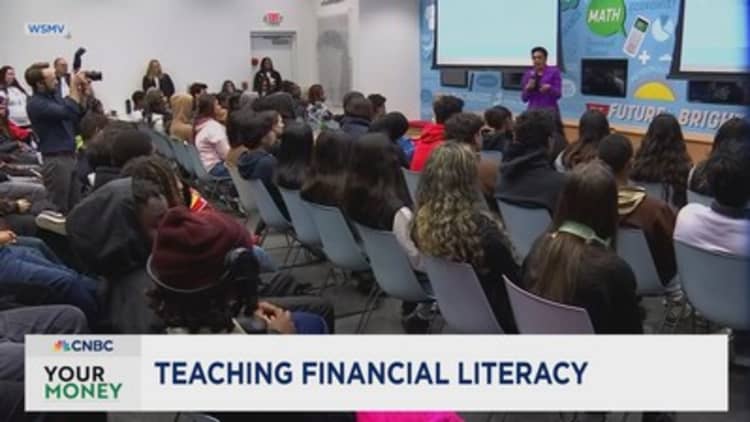Here are 3 money tips every high school student should know
[ad_1]

NASHVILLE, Tenn. — As Tennessee leads many states in financial literacy in public high schools, Junior Achievement of Middle Tennessee aims to boost those lessons through career, entrepreneurship and personal finance programs.
Speaking to high school students in December at Junior Achievement’s Finance Park program in Nashville, CNBC’s senior personal finance correspondent Sharon Epperson shared her career journey and offered personal finance tips.
“You’re going to be something that you want to be — whatever that is — because you will have the tools to do it,” she said.
Here are three personal finance tips Epperson shared with the high school students.
1. Open a high-yield savings account
2. Invest in a Roth individual retirement account
With a part-time job, “you’re already set up to be an investor,” Epperson told the students. “Not just a saver, but an investor.”
Here’s why: With so-called earned income, students can contribute to a Roth individual retirement account, which provides tax-free growth on investments. You contribute after-tax money but won’t owe taxes on Roth IRA withdrawals in retirement. Tax-free earnings are powerful for younger investors with decades until their golden years.
3. Avoid credit card debt
Epperson also warned students about the “risk of plastic” and amassing credit card debt, which can be difficult to pay back.
To avoid problems, she suggested, use a prepaid card for purchases and join a parent or guardian’s credit card as an authorized user before applying for a student credit card at age 18.
Opportunity to ‘make adult decisions’
After speaking, Epperson participated as a volunteer in Finance Park, Junior Achievement’s capstone financial literacy program, which gives students the chance to “make adult decisions before they’re adults,” according to Trent Klingensmith, president of Junior Achievement of Middle Tennessee, which serves 22 counties.
After 13 weeks of classroom-based lessons, Finance Park culminates with a real-life budgeting simulation at Junior Achievement’s facility — including savings, investing and debt payoff — based on the student’s career decisions.
The experience lets them touch it, feel it and see it before they have to be it.
Trent Klingensmith
President at Junior Achievement of Middle Tennessee
“The experience lets them touch it, feel it and see it before they have to be it,” said Klingensmith.
While the organization aims to have 32,000 Middle Tennessee students participate in various programs during the 2023-2024 school year, the “biggest need is volunteers,” Klingensmith said.
‘You leave a little seed in their brain’
Volunteers participate with students during every step of Finance Park. It’s a rewarding experience for board member Claudia Zuazua, who often works with the program’s Latino students.
Born and raised in Mexico City, Zuazua, who is bilingual, said she knows the cultural differences many Latino students face when learning about personal finance — especially when English is a second language.
“They know there’s someone who understands,” said Zuazua, who has also lived in Peru and Colombia. In Metro Nashville Public Schools, nearly one-third of enrolled students were Hispanic during the 2022-2023 academic year, compared with only 1.6% of teachers.
Finance Park offers the chance for students to explore career opportunities while practicing real-world money management skills. “You leave a little seed in their brain,” Zuazua said. “I think that’s what matters.”
[ad_2]
Source link




